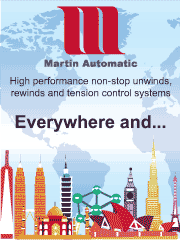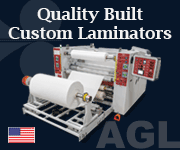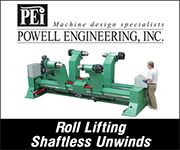Shared Focus Makes for One Successful Company
- Published: July 01, 2001, By Edward Boyle, Contributing Editor
Two label converters come together, and the result is award-winning synergy.
Tag & Label Corp. and TTL Corp. could have been twin converting operations “separated at birth” some 30 years ago. That is, until an investment group brought the nearly identical companies together in 1998 to create Advanced Labelworx, one of the nation's largest — and best managed — label converters.
TTL Corp. was founded in Knoxville, TN, in 1968; Tag & Label Corp. (TLC) followed in Anderson, SC, three years later. The two companies had much in common: Both were established by entrepreneurs with a background in flexographic printing to serve largely industrial markets, such as OEM manufacturers with label needs that require agency approvals (Underwriters Lab, Canadian Standards Assn., American/Canadian Gas Assn., etc.). The majority of labels manufactured by both TLC and TTL are used to provide instructions, warnings, and product information for such markets as electrical; textiles and fibers; automotive; appliance and outdoor applications; pharmaceuticals; and chemicals.
Labelworx president Lana Sellers, with an extensive background in industry and management as a consultant with Coopers & Lybrand, put together an investment group in 1994 to purchase Tag and Label Corp.; TTL was acquired four years later. A screen printing division was added in Anderson in 1999 to provide flat-bed screen products. The merger of the two companies in August 1998 created Advanced Labelworx, which has been ranked as one of the top 40 label companies by size in the US.
Barrier Makes It Work
Ironically, though the original two companies are located just 150 miles apart, they shared virtually no customer base. The reason, says Sellers, is quite natural. Or, more appropriately, nature.
“It's the mountains,” Sellers explains, referring to the Appalachian and Great Smoky mountain ranges that literally separate Tennessee and South Carolina, as well as TTL and TLC. “It was just too much trouble for TTL to go into the Carolinas, and it was tough for Tag and Label to come over here. So, they each kind of stayed on their own side of the Smoky Mountains. It was a natural barrier.”
Ultimately, however, the barrier that allowed the two companies to grow separately made them an ideal team. Today, the two facilities serve customers around the world, including China, though the vast majority of Labelworx's customer base is located in North America, more specifically the eastern two-thirds of the US.
Its labels are found on “whatever is at Home Depot,” explains Sellers. “You go in there and see everything from outdoor power equipment and automotive supplies to electrical supplies and small appliances. That's who we're selling to.”
The combined operations house nine 7-in. in-line presses; five 7-in. drum presses; and four 16-in. in-line units. Most of the presses are equipped with ultraviolet curing stations (equipment is from various suppliers), and one press has an in-line Delphax ion deposition unit. TTL also houses two flat-bed screen presses, one from RSP and one from Colt, and both facilities utilize Arpeco inspection equipment and die-cutters. Labelworx also operates a Data-Mark Div. that sells thermal printers, design software, and other printing supplies.
Sellers says the decision to combine the two ISO-9002-certified converting operations with similar customer bases, rather than adding, for example, a prime label house, was simply a matter of doing more of what each company did best. The facilities were established with, and continue to maintain, “similarity of equipment, a similarity of focus” that combine to provide “two really good pieces to the same puzzle,” Sellers reports.
Going the Extra Mile
In addition to converting flexo and screen labels in 7-16-in. widths to ten colors, the companies offer their customers extensive technical support. For example, Advanced Labelworx offers full graphic design, art prep, and digital asset management support; comprehensive label construction engineering support for design, testing, prototypes, and agency approvals; the previously mentioned on-press ion deposition system for high-speed variable imprinting of bar codes, numbers, and other data; a Pantone® color-certified digital printing and plotter cutter system for prototypes and very short runs; a service bureau for thermal transfer; and a line of semi-automatic/automatic label dispensing equipment and print-and-apply systems.
Labelworx's screen printing facility offers graphic overlays, nameplates, outdoor durable decals, domed emblems, insulators, and other die-cut components. The company converts a wide range of materials, including traditional and specialty papers, polycarbonate/Lexan graphic films, rigid and flexible polyvinyl chloride films, polystyrene and polyester/Mylar films, and more using raw materials from companies including DuPont, FLEXcon, Fasson, Emtech, and MACtac.
“The combination of the two facilities,” says Sellers, “has allowed both sales forces to offer their customers something that maybe they weren't able to offer individually.”
Award-Winning Management Style
And, says Sellers, while Advanced Labelworx has invested in new equipment at both facilities, it has concentrated primarily on providing “productivity enhancements” and improving the internal management systems of each facility.
“Our philosophy has been ‘Let's make sure we have the talent on board, and let's make sure we have the infrastructure in systems to handle combining the two operations. How do you enhance productivity? How do I get an order from the phone back to the floor as quickly as possible? Do I have the right information at my fingertips? We've developed computerized management systems that give our people the answers they need and allow them to better meet the needs of their customers,” says Sellers.
In fact, Advanced Labelworx has been so successful in streamlining its internal operations that the company was honored recently with a “Best Managed Company” award from the Tag & Label Mfrs. Inst. (TLMI). The award is based on TLMI's Annual Ratio Study, which measures company efficiencies in areas such as inventory turnover, waste management, delivery times, and other critical aspects of running a manufacturing operation.
“I didn't grow up in the label business,” explains Sellers, pointing to her days with Coopers & Lybrand, “but it's been my experience that if you can key into what important statistics and information are needed by your management staff, provide that information on a timely basis to the right people, and make sure they know how to use it, it can make a world of difference.”
Sellers continues: “The report that TLMI provides us [as part of its Ratio Study] is tremendous, because it tells us how we compare when measured against other companies that are in our size range; so many label converters are privately held, how can you tell if you're doing good, above average, or below average in comparison to your competitors? Maybe I'm growing as a company, but maybe I'm growing because I'm pricing my product too low. I cannot tell you how important the TLMI report is in helping us benchmark ourselves as we continually strive for improvement. If I'm doing good on receivables, how's my inventory control? How's my gross margin looking? It's really about trying to improve the bottom line and making ourselves more competitive, because once you're financially successful, you have the freedom to make further acquisitions and support rapid growth.”
The Personal Touch
At a time when margins are being tightened in the consumer marketplace, Sellers notes that improving those internal efficiencies has allowed the two converting facilities to compete more successfully. She appreciates the fact that label buyers, like consumers, have a greater variety of purchasing options than ever before. And improving its own efficiencies makes Labelworx a more attractive label supplier.
“I think it also has a lot to do with personal relationships,” Sellers says. “We've been looking to increase sales like everyone else by using things such as the Internet, but I still believe that people buy from people they like doing business with. It's having a good technical sales force, having good internal support systems, providing good service, and being somebody people feel comfortable buying from.
“Why do you go to McDonald's rather than Burger King, or the other way around? Maybe you think the burgers are better, the facilities are cleaner, or you just have easier access to one. A lot of it simply has to do with consistency of service and knowing what you're going to get when you go in there. That's why we place so much emphasis on that. If you let your customer down, somebody else is out there to pick them up. Well, I like my customers, and I want to keep them!”
CONVERTER CONNECTION
Advanced Labelworx, Oak Ridge, TN
800/844-8711
SUPPLIER INFORMATION
Delphax Systems, Canton, MA; 617/828-9917
RSP, dist. by S.P.E. Inc., Huntington Beach, CA; 714/848-7661
Colt, dist. by E.W. Dorn Co. , Gardenia, CA 888/665-3676.
Arpeco Engineering Ltd., Mississauga, ON, Canada; 905/564-5150
DuPont Cyrel, Wilmington, DE; 302/999-4512
FLEXcon Co. Inc., Spencer, MA; 508/885-8200
Fasson Films/Avery Dennison, Painesville, OH; 216/639-3000
Emtech, Medina, OH; 330/725-1444;
MACtac, Stow, OH; 330/688-1111
Mark Andy Inc., Chesterfield, MO; 636/532-1510













